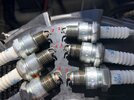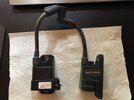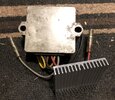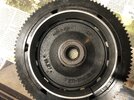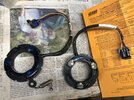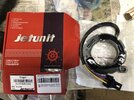ripcuda
Active Member
Hi Gang. I got my new-to-me '00 Challenger 2000 with the Mercury 240 efi (gen1, round cover) a week ago. I bought it non-running. Last ran 2 years ago but wouldn't rev up past about 1/2 throttle as the story goes.
Seller was right. It starts and runs great... throttle seems normal up till about 50%... just enough throttle to get on-plane and cruise at 25mph. Throttle above that and it sounds like it's "loading up" (2-stroker too rich)... or there is ignition problems... but it doesn't hesitate or studder or die. I pull throttle back and it seems to run fine at 3800 rpms and boat cruises nicely.
Before I lake tested it (as described above)... I did all the stuff
Compression is good: 135psi +/- 3 in each cylinder.
Fuel system:
- old fuel drained, all fresh 91 fuel (premixed)
- new fuel filter/water-separator, cleaned lift pump pre-filter, cleaned hi-pressure fuel pump strainer
- disassembled and cleaned VST, checked float is good
- rebuilt pulse fuel pump
- tested fuel pressure 35psi primed and while running
- injectors cleaned and tested... good, equal spray patterns in all 6
- new intake manifold base gaskets (to reed block) and intake lid seal gasket
- reeds visually inspected good, none chipped/broken
- oil pump/tanks removed, block-off plate installed, pressure port for oil tank plugged, VST oil-in port plugged, pre-mixing 50:1 (good Quicksilver oil)
So I'm very confident in the fueling system of the engine. It primes as expected and starts instantly (love efi)... even when hot... on the trailer or in the water.
Ignition related:
- new port head temperature sensor
- tested air temperature sensor - ohmed as expected for given temps
- ** tested (ohmed) triggers. All 3 right at 950 ohms... which is just below the min of 1100--1300 ohms. Based on trigger wires/loom, it is not original.
- tested mag stator. All ohms in spec.
- ** found broken/missing ground wires to both Ignition Controller module and Rev limiter module. Fixed both ground wires, both now grounded.
- did not test timing yet. was told it ran great before this can't rev beyond 4k issue started... and flywheel nor timing screws have been touched.
- all wiring hooked up per wiring schematic, all connectors unplugged-cleaned-reconnected
- ** 1 spark plug boot gives my finger a tingle-shock while running... are plug wires/boots replaceable?
Charging related:
- ** One regulator is bad (blows fuse). I've ordered 2 new ones.
- working reg seems to be keeping battery topped off. 14.2v at battery while running 3800 rpms.
- battery is healthy and fully charged, no troubles starting or running
- all fuses good (expect one for bad regulator)... engine fuses
Well that's what I know so far. Next up is testing TPS, confirming timing is good and testing spark at 3800 rpms.
Would failing/bad triggers only affect upper rpms?
Could the Ignition Control module been damaged when it was previously run w/o a ground wire?
Cheers!
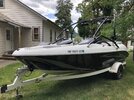
Seller was right. It starts and runs great... throttle seems normal up till about 50%... just enough throttle to get on-plane and cruise at 25mph. Throttle above that and it sounds like it's "loading up" (2-stroker too rich)... or there is ignition problems... but it doesn't hesitate or studder or die. I pull throttle back and it seems to run fine at 3800 rpms and boat cruises nicely.
Before I lake tested it (as described above)... I did all the stuff
Compression is good: 135psi +/- 3 in each cylinder.
Fuel system:
- old fuel drained, all fresh 91 fuel (premixed)
- new fuel filter/water-separator, cleaned lift pump pre-filter, cleaned hi-pressure fuel pump strainer
- disassembled and cleaned VST, checked float is good
- rebuilt pulse fuel pump
- tested fuel pressure 35psi primed and while running
- injectors cleaned and tested... good, equal spray patterns in all 6
- new intake manifold base gaskets (to reed block) and intake lid seal gasket
- reeds visually inspected good, none chipped/broken
- oil pump/tanks removed, block-off plate installed, pressure port for oil tank plugged, VST oil-in port plugged, pre-mixing 50:1 (good Quicksilver oil)
So I'm very confident in the fueling system of the engine. It primes as expected and starts instantly (love efi)... even when hot... on the trailer or in the water.
Ignition related:
- new port head temperature sensor
- tested air temperature sensor - ohmed as expected for given temps
- ** tested (ohmed) triggers. All 3 right at 950 ohms... which is just below the min of 1100--1300 ohms. Based on trigger wires/loom, it is not original.
- tested mag stator. All ohms in spec.
- ** found broken/missing ground wires to both Ignition Controller module and Rev limiter module. Fixed both ground wires, both now grounded.
- did not test timing yet. was told it ran great before this can't rev beyond 4k issue started... and flywheel nor timing screws have been touched.
- all wiring hooked up per wiring schematic, all connectors unplugged-cleaned-reconnected
- ** 1 spark plug boot gives my finger a tingle-shock while running... are plug wires/boots replaceable?
Charging related:
- ** One regulator is bad (blows fuse). I've ordered 2 new ones.
- working reg seems to be keeping battery topped off. 14.2v at battery while running 3800 rpms.
- battery is healthy and fully charged, no troubles starting or running
- all fuses good (expect one for bad regulator)... engine fuses
Well that's what I know so far. Next up is testing TPS, confirming timing is good and testing spark at 3800 rpms.
Would failing/bad triggers only affect upper rpms?
Could the Ignition Control module been damaged when it was previously run w/o a ground wire?
Cheers!





